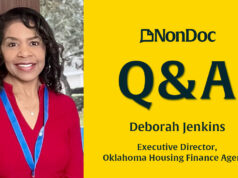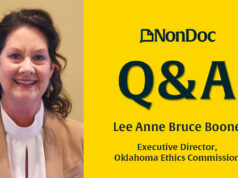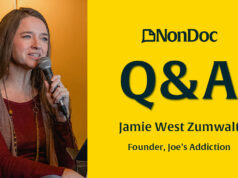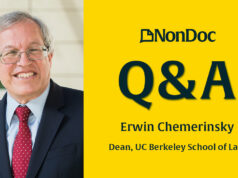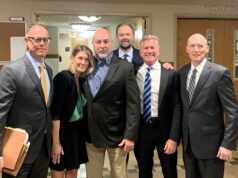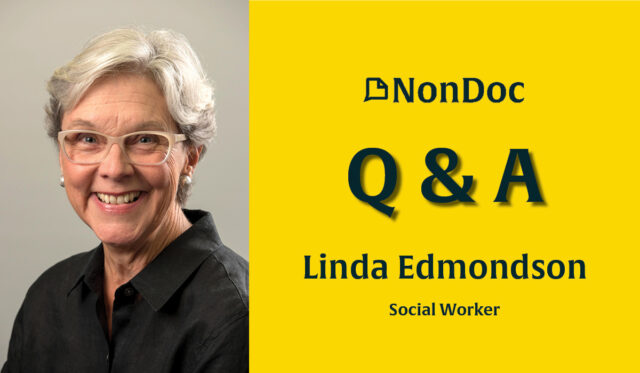
As the daughter of a former Oklahoma House of Representatives member who married a future Oklahoma attorney general, Linda Edmondson is accustomed to life in the public eye.
Edmondson retired as a social worker after a career serving Oklahomans at the Department of Human Services, Muskogee Public Schools and the Muskogee Regional Medical Center. She has served on numerous nonprofit and public governing boards throughout her career and has been a longtime supporter of NonDoc. (Be like Linda.)
In this Q&A, Linda Edmondson discusses the highlights of her career in social work and offers advice to those interested in nonprofit work or running for a political office.
The following conversation has been edited lightly for clarity and style.
Tell us about yourself. Where did you grow up, and what inspired you to get into social work?
I grew up near Fargo, Oklahoma, in Ellis County. My dad was a farmer and a member of the Oklahoma House of Representatives. My mother was a high school teacher, and I always thought I would be a teacher, too. I graduated from Northeastern State University in Tahlequah with a teaching certificate in secondary social studies. But after my husband moved back to Muskogee in 1972, I could not find a teaching job so I went to work for the Department of Human Services where a degree in social work was not required.
What surprised you the most about the nature of social work? Is there a particular experience you had that comes to mind and highlights the importance of the job?
I started out not knowing much at all about social work, so most everything about the job surprised me. I had never known many Black people, but my caseload was almost all young Black mothers. I had never lived in Muskogee before, so even finding addresses to make home visits was difficult. I was supposed to be helping my clients find the help they needed to get more education and find a job when I wasn’t familiar with the few resources available. But what really surprised me was how much I had in common with the women I was meeting and trying to help. We were all young mothers, trying to figure out how to raise our kids.
I remember one young client who seemed to have a lot of ability to move up in the world. I was talking to her about going to a daytime GED program to get her high school diploma so she could pursue her ambition of going to nursing school. I even gave her a ride to enroll and get started, but she didn’t go back to the classes. I drove to her house, a little irritated that she had not followed through and wondering what had happened. Embarrassed, she finally admitted to me that she couldn’t read. I was astonished! She managed her household and kids so well that I couldn’t imagine she couldn’t read. It was then I discovered Muskogee didn’t have a program to teach adults to read, which I later helped establish.
That’s just one example of the people I met and the resources I was able to help develop in Muskogee working for the welfare department. I soon loved what I was doing and never wanted to go back to a classroom full of kids. Eventually, I did go work at Muskogee Public Schools as a special education consultant, getting my special education certification and working with parents of children with disabilities. Then I went on to get my master’s degree in social work at the University of Oklahoma.
Having served on numerous nonprofit and public governing boards, what advice do you have for those looking to be of service to an organization or entity?
In Muskogee, I helped start several nonprofit organizations, providing services for unmet needs. I also served on the nonprofit boards of those organizations, but that probably isn’t the most typical way to get started. Volunteering for organizations doing the kind of work that you are interested in is usually the best way. Nonprofits almost always need volunteers. It is a good way to meet the staff and board members and find out if you really enjoy the work and the mission.
A lot of people may know you and your husband, Drew Edmondson, from the time he served in elected statewide office as attorney general. Public service can be a stress and a challenge for any family, so do you have any advice for people and their spouses who might be considering a run for elected office?
I’ve talked to many spouses (until recently they were almost all women) about the changes that they will encounter if their partner goes into politics. Campaigning for most offices still involves a lot of door-to-door, store-to-store and crowd contact with strangers. Some people may really enjoy this. Others don’t. Many voters expect a spouse to show up with the candidate at public events and speeches. Some people may enjoy this. Others won’t. Some spouses can step into a campaign office and be a real help. Others aren’t good at managing staff and volunteers when the effort is so personally focused.
My first advice is: Don’t do any of this if you don’t enjoy it. Voters will figure out your heart isn’t in it, and you won’t be helping the candidate. But if you are willing to try, remember these things: Campaigning is making contacts and establishing rapport with strangers briefly. Keep working on that. Listen more than you talk. On the campaign trail, never pass up a meal or a bathroom. My personal campaign motto has always been: If you can fry it, I can eat it.
Now that you’re retired, what accomplishments are you most proud of, and what advice do you have for anyone approaching retirement themselves?
This is a difficult question. I can’t point to any organization or building or law that exists because of my efforts. Although I am certainly proud of my kids and the wonderful adults they have become, I’ve never thought that parents should take credit for their kids unless they are willing to own their failures as well as their successes. I think I was a great deal of help to Drew in his political career and years of public service, but his accomplishments really belong to him, not me. I’ve accomplished things in my life, and I’m proud of many things I’ve worked on, but making a list is probably impossible.
I flunked retirement the first time I tried it. I couldn’t adjust to the slower pace, and I went back to work after several months. The second time, I did it more gradually, working part-time for a while. I later helped in one of Drew’s campaigns as a volunteer and did some consulting before finally being willing to say I was retired. If you have had a successful career, nonprofits will be trying to get you more involved in their work, doing the same kinds of things for free. My advice is to be careful what you agree to, because full-time volunteer work isn’t really retirement. It has been hard for me to find a speed of living in between 100 miles per hour and totally stopped, and it continues to be hard to say no to things, even if I don’t want to do them. I try to remember I would rather work in the garden or cook something or read a book. Finding enjoyment in self-indulgence is difficult for people who have worked at something their whole lives, but at the age of 76, I’m finally learning.
I’m told by my bosses that you have been a strong donor to NonDoc over the years, although they reminded me that we politely decline donations from active politicians or candidates. Why do you believe in supporting local journalism, and what is another local nonprofit (in a different sector) that you would encourage people to support?
I’ve read a daily paper my whole life, from second grade when I first found the comics in The Daily Oklahoman. For years, that local newspaper was my window into the world. Gradually, I figured out that NPR did a better job at national and world reporting, and I added public radio to my daily intake. The TV network news, in past decades, was helpful too, but TV has never been my first source for news. In recent years, however, the newspapers all over the country have dwindled as electronic news, in all its forms, has grown. But it is much harder to find the real news on social media.
When NonDoc started and I realized that it was covering things I really wanted to know about better than any other news source, I thought it would need help to survive, so I sent what I could afford. There are other digital news sources that are doing a good job of covering Oklahoma news, and I donate to them, too. I subscribe to the New York Times and the Washington Post online, and because old habits die hard, I still subscribe to The Oklahoman, though I no longer read the comics.
I admire and support so many nonprofits that it is hard to mention just one. Probably my favorite is the Oklahoma Policy Institute. It is an independent nonprofit, nonpartisan (but left-leaning) policy think tank. Its main office is in Tulsa, but its focus has always been statewide. As the state has moved to the right in the last 15 years, OK Policy has kept a centrist progressive focus on policy issues affecting Oklahoma by doing credible research, expert analysis and thoughtful advocacy. As its unofficial motto says: No Bullshit, Great Charts.









